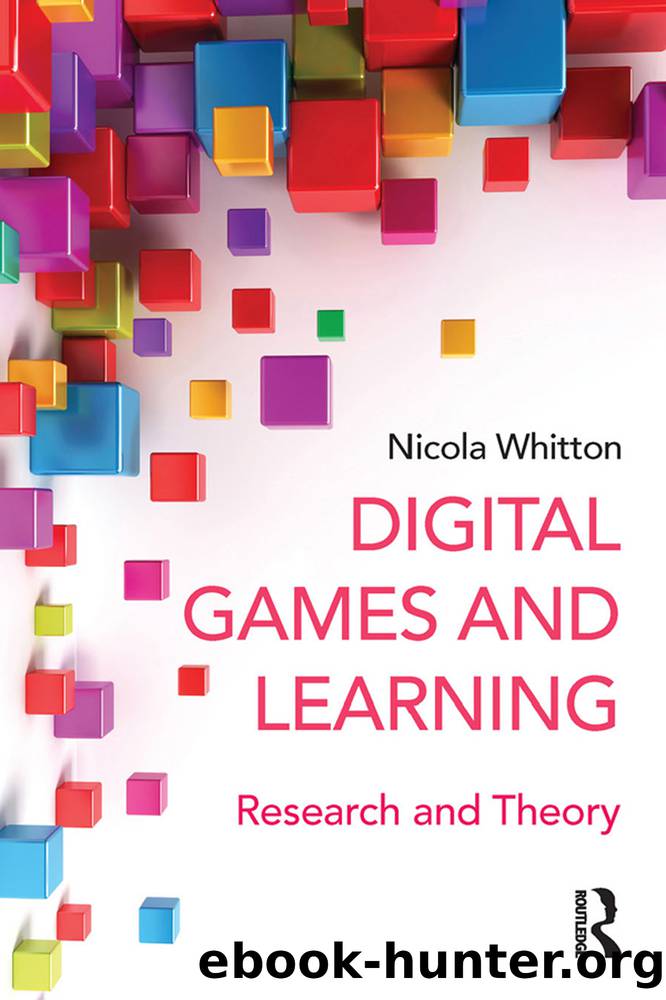Digital Games and Learning by Nicola Whitton;

Author:Nicola Whitton; [Whitton, Nicola]
Language: eng
Format: epub
ISBN: 9781136216435
Publisher: Taylor & Francis (Unlimited)
Published: 2022-06-15T00:00:00+00:00
Brown and Vaughan (2010) themselves note the similarity of the play experience to the characteristics of flow (CsÃkszentmihályi, 1992, see Chapter 6 for more detail), particularly in relation to freedom from time and the lessened sense of self. Again, the notion that play is a voluntary activity is present. This presents an interesting consideration for the fi eld of games and learning: for if a game is used in a formal context, where the learner has no freedom of choice over whether to take part, does that mean that it can no longer be considered play? I agree with the first point, that play has to involve freedom, joyfulness and fun, but disagree that this is contingent on the voluntary nature of the activity. In educational settings, a game may not be voluntary (in that the players have no option to opt out) but it can still be something entered into in a spirit of play; given the external goal of learning (which may, or may not, be voluntary). The activity may not be voluntary, but may still be preferable to an alternative activity, and is undertaken as part of the overall engagement in education. Of course, there may be individuals who refuse to âplayâ a game (as there may be in any educational activity) who will have a different type of learning experience. Caillois (2001) also considers play to be an activity that is voluntary, and one that is separate from the real world, uncertain, unproductive and governed by convention and make-believe. He presents four categories of play: agon (competitive play); alea (games of chance); mimicry (role-play and children's games) and ilinx (play through physical sensation, such as fairground rides).
Brown and Vaughan (2010) also describe a framework created by play historian Scott Eberle, which shows a six-stage process that he says people go through as they play. The stages are as follows:
Anticipation. Waiting with expectation, curiosity, perhaps a little anxiety.
Surprise. Discovery of the unexpected, a new sensation, idea or shifting perspective.
Pleasure. A good feeling.
Understanding. The acquisition of new knowledge or a synthesis of existing knowledge.
Strength. The mastery that comes from experience and understanding, and the empowerment of coming through an experience unscathed.
Poise. Contentment, composure and a sense of balance in life.
Download
This site does not store any files on its server. We only index and link to content provided by other sites. Please contact the content providers to delete copyright contents if any and email us, we'll remove relevant links or contents immediately.
The Infinite Retina by Robert Scoble Irena Cronin(5504)
Harry Potter and the Cursed Child: The Journey by Harry Potter Theatrical Productions(4310)
The Sports Rules Book by Human Kinetics(4069)
Molly's Game: From Hollywood's Elite to Wall Street's Billionaire Boys Club, My High-Stakes Adventure in the World of Underground Poker by Molly Bloom(3329)
A Knight of the Seven Kingdoms by George R R Martin(3025)
Quidditch Through the Ages by J.K. Rowling(2996)
How To by Randall Munroe(2911)
Quidditch Through the Ages by J K Rowling & Kennilworthy Whisp(2875)
Quidditch Through the Ages by Kennilworthy Whisp by J.K. Rowling(2750)
Flowers For Algernon by Daniel Keyes(2739)
Quidditch through the Ages by J. K. Rowling(2698)
Stacked Decks by The Rotenberg Collection(2682)
Quidditch Through The Ages by J. K. Rowling(2665)
776 Stupidest Things Ever Said by Ross Petras(2584)
Ready Player One: A Novel by Ernest Cline(2559)
What If?: Serious Scientific Answers to Absurd Hypothetical Questions by Randall Munroe(2542)
Beautiful Oblivion by Jamie McGuire(2466)
The Book of Questions: Revised and Updated by Gregory Stock Ph.d(2447)
Champions of Illusion by Susana Martinez-Conde & Stephen Macknik(2324)
